
The CSUSB History Department's Assistant Professor Marc Arsell Robinson has been invited for numerous media appearance and guest lectures following the publication of his new book from New York University Press, Washington State Rising: Black Power on Campus in the Pacific Northwest. It is not unusual for the author of an outstanding new scholarly book in History to be invited to present their findings in an academic context like a guest lecture, but in the past year, in addition to numerous scholarly book talks, Professor Robinson has also seen invitations for keynote addresses, newspaper interviews, and public radio appearances up and down the Pacific coast.
Most recently, the South Seattle Emerald featured a wide-ranging interview with Dr. Robinson in which journalist Adam Willems asked about protest and campus movements. In this interview, as in his recent book, Professor Robinson brings nuance and rich complexity to the landscape of campus protest and movements for social justice over the previous decades and up to the present. From the Black Student Unions of the 1960s and 1970s through the recent Gaza protests and crackdowns, Robinson is able to see both change and continuity in a number of variables such as gender inclusion, law enforcement responses and more.
In the lead-up to the book's August 2023 publication, Dr. Robinson was invited to programs including Libby Denkmann's "Soundside" on Seattle Public Radio's KUOW, and to speak with Brandon Hollingsworth on Spokane Public Radio, KPBX, in partnership with Rick Dulock and our KVCR station here in the Inland Empire. More recently, Robinson was invited to the New Books Network in February 2024 in conversation with Professor Stephen Hausmann of University of St. Thomas's in Minnesota. Also in February, Robinson spoke about his new book with Emmy Award-winning interviewer, Marilyn Solomon, through the Osher Lifelong Learning Institute. The book was also featured in an article by Leinani Lucas in the Seattle-based community newspaper, Real Change. In addition to these media appearances, Dr. Robinson has been invited to deliver keynote addresses at a number of museums, universities, and other venues from Eugene to Spokane to Seattle, across the states of Washington and Oregon. In nearly two dozen media and scholarly appearances, Professor Robinson has brought a spotlight to a topic and period that is important but underexamined in the history of the Pacific Northwest region and the national history of the Black power movement.
Based on extensive oral history interviews among other source materials, Robinson's new book recounts the development of the Black Student Union (BSU) across campuses in Washington state, tracing the differences in rural and urban contexts, the ways in which the BSU originated and developed across the region, and its impact. While focused on the years 1967 to 1970, Robinson also provides context for later developments in social justice activism up to the present. Washington State Rising: Black Power on Campus in the Pacific Northwest is available from NYU Press, Amazon, Barnes and Noble, and other book sellers, in hardcover and ebook version.

History Department Assistant Professor Daisy Ocampo Diaz has received the CSUSB College of Social and Behavioral Sciences Outstanding Junior Faculty Award for the 2023-24 academic year.
Her recent book, Where We Belong: Chemehuevi and Caxcan Preservation of Sacred Mountains was published last year by University of Arizona press, and was featured in a book talk in the new Provost Presents Faculty Research series.
Dr. Ocampo Diaz has also served as historical consultant for a new documentary film, Pa'Chapa: A Mt. Rubidoux Story, which will premiere May 2 at the UCR Arts Life Building in downtown Riverside.
As an inspiring and excellent instructor and advisor, Dr. Ocampo Diaz has taught many popular courses including "Decolonizing Museums," as well as advising many undergraduate students and serving as lead advisor for two Master of Arts students, Lina Tejeda and Gabrielle Velazquez.
Dr. Ocampo Diaz is also curator in the development of a forthcoming exhibit "Fire Kinship: Southern California Native Ecology and Art" for the UCLA Fowler Museum. In developing the exhibit, she has collaborated with Michael Chavez (Tongva), Archaeological Collections Manager, NAGPRA Project Manager, Fowler Museum and CSUSB History BA and MA graduate; and Lina Tejeda (Pomo), Graduate Student Research Assistant and one of her MA advisees at CSUSB.
Of the exhibit, Dr. Ocampo Diaz writes: "Prior the colonization of Southern California in 18th century, Native communities throughout the region deployed controlled fire regimes to ensure the well-being of their local ecosystems. Fire-based land management practices ranged from small burns to spur healthy growth, to larger burns that strategically eradicate invasive species and reduce fuel loads (preventing catastrophic natural fires). Fire Kinship counters attitudes of fear and illegality around fire, arguing for a return to Native practices in which fire is regarded as a vital aspect of land stewardship, community wellbeing, and tribal sovereignty.
"A selection of baskets, ollas, rabbit sticks, bark skirts, and a canoe in this exhibition were made possible through the relationship between people, place, and fire. Commissioned video, sculpture, portrait paintings, and installations by contemporary artists respond to and rejoin these cultural objects, spurring a dialogue of critique, reflection, and futurity. The exhibition presents a living history that centers the expertise of Tongva, Cahuilla, Luiseño, and Kumeyaay communities (past and present?). Fire Kinship reintroduces fire as a generative element, one that connects California residents to their past and offers many more a path toward a sustainable future."
Congratulations on this richly deserved recognition, Dr. Daisy Ocampo Diaz!

Associate Professor Cary Barber (CSUSB History) was invited by Prof. Michele Bellomo to give a guest lecture at Universitá di Milano on April 4, 2024. The lecture -- "The 'Senatorial Middle Republic' (320-130 BCE): New Approaches and Models" -- was part of a larger Roman History unit within a brand-new English-language BA program (co-hosted with Università Ca' Foscari Venezia) entitled Ancient Civilizations for the Contemporary World, which has the following mission: "The Bachelor’s programme ACCW, jointly hosted by University of Milan La Statale and Ca’ Foscari University of Venice, addresses the current, multi-disciplinary and international debate on the relevance of studying Ancient Civilizations for critically assessing the complexities of today's world."
This invited lecture in Milan was part of a research trip that took Dr. Barber across Lombardia, Imperia, and Liguria, IT and Provence, FR (named after the old Roman province!) as part of a project entitled "The Huntress and the Queen: Religious Symbolism, Indigenous Resistance, and the Establishment of Frontiers in Rome's 'Italian Empire.'" Dr. Barber also recently published a new co-authored article in the journal Administration & Society (Q1 for Public Admin, Sociology, and Political Science): Van Wart, M., Hall, J. L., Barber, C. M., & McIntyre, M. (2024). "Another Civil War in America? Comparing the Social Psychology of the United States of the 1850s to Today." Administration & Society, 0(0). https://doi.org/10.1177/00953997241244701. This new article was co-written with CSUSB faculty from Public Administration, History, and Psychology. Abstract: Scholars warn that another American civil war is increasingly plausible, if still unlikely; professional political commentators express greater concerns. This study examines the likelihood of another U.S. civil war by comparing perspectives of the 1850s with those of today by using a negative social capital framework as the analytic lens. The analysis finds striking similarities between the two periods. Yet, civil war is a relatively rare phenomenon in developed countries, and the analysis also points to contemporary mitigating examples. At least for the foreseeable future, more likely are trajectories moving toward other types of social unrest short of civil war: ongoing civil strife, additional insurrections, decades-long intraregional political gridlock causing widespread administrative dysfunction, and even a failure to relinquish power. The negative social psychology has already had an extraordinary impact on public administration and is unlikely to decrease in the near term; it may yet increase exponentially as it did in the 1860s.

We invite you to a symposium on Contemporary Africa, Wednesday, April 24 from 10 a.m. to 12 p.m. in CGI 218. You can join us in person or by Zoom. Please see attached flyer for details (link). Zoom here or click the below button https://csusb.zoom.us/j/85041173797
Faculty Presenters:
- Jiri Preis, University of West Bohemia, Czech Republic
- The Africa We Want (and Why We Should Want it)
- Sylvia Croese, University of California, Irvine
- Localizing Urban Transitions in Africa
- Tiffany F. Jones, California State University, San Bernardino
- Gender and Development Initiatives in South Africa, Thirty Years After Apartheid
- Arianna Huhn, California State University, San Bernardino
- De-Centering the West in African Heritage
Sponsored by the Department of Geography and Environmental Studies.
For further information, please email Mike Kohout: mkohout@csusb.edu.

Students from CSUSB and Dr. Michelle Lorimer have been working to support regional 4-12th grade students for National History Day (NHD). In early March 2024, History majors and credential-level CSUSB students joined Dr. Lorimer at Rialto’s Wilmer Amina Carter High School to serve as volunteer judges for the San Bernardino County NHD regional competition.
Judges viewed student-produced websites, exhibits, performances, and listened to podcasts focused on the theme “Turning Points in History.” Projects that placed in the top of their categories advanced to California State NHD competition (NHD-CA), held in Sacramento April 19-21, 2024. CSUSB pre-credential history student Kathleen Boswell supported the research needs of Priti Garcia (a senior) and Carlos Gutierrez Gonzalez (a junior) from Oak Hills High School working with teacher Mrs. Jeni Boulanger (pictured) to revise their project to compete at the state level NHD-CA.
With a project titled “Deinstitutionalization: How California Led a Turning Point in Mental Health History” (pictured), these students medaled at the state competition as Honorable Mention – placing 4th in their category! Along with judging state-level projects, Mrs. Boulanger, Dr. Lorimer, and CSUSB students Kathleen Boswell and Leah Clark are working to develop opportunities to expand NHD support for teachers and students in San Bernardino County in 2024-2025 and beyond!
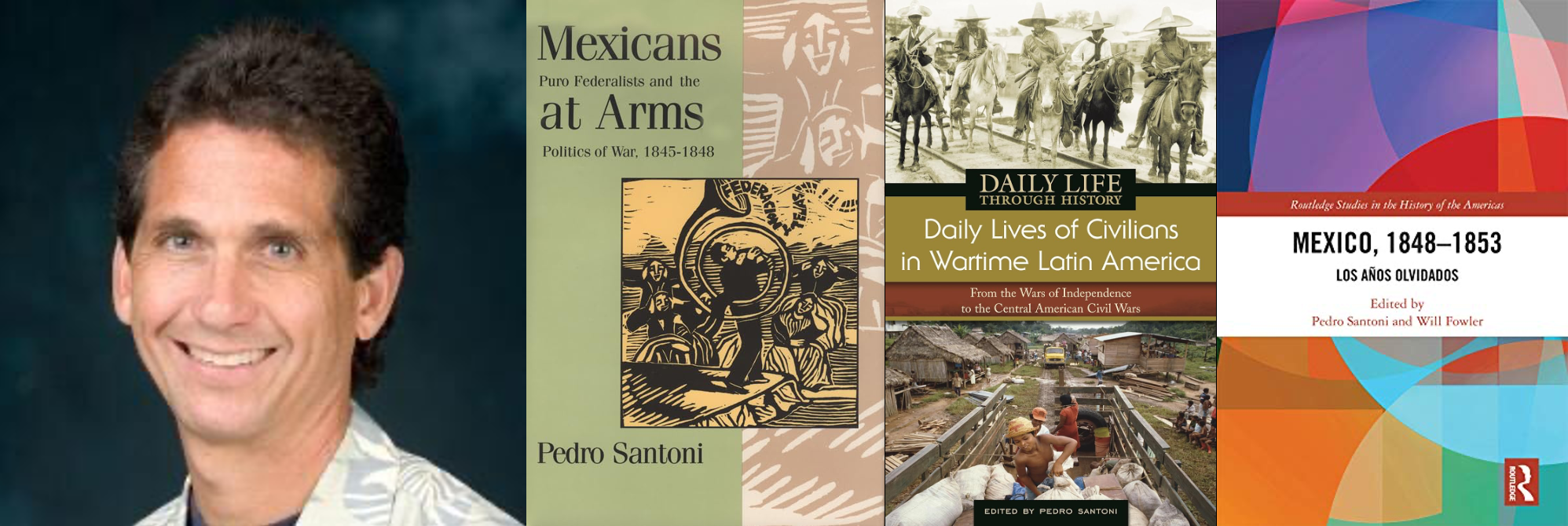
This June (2024), Dr. Pedro Santoni will retire from the History Department, and he will be missed by students, colleagues, and coworkers. He is an excellent scholar of Latin America, a demanding and enriching educator, and a stalwart mentor and colleague.
Dr. Santoni’s publications include three books – Mexicans at Arms: Puro Federalists and the Politics of War, 1845-1848 (TCU Press, 1996), Daily Lives of Civilians in Wartime Latin America (Greenwood, 2008), and Mexico, 1848-1853: Los Años Olvidados (Routledge, 2019) – and many other scholarly articles, book chapters, and reviews He earned a doctoral degree in Latin American history from El Colegio de México, a Juris Doctor degree from the University of Puerto Rico, and a Bachelor of Arts from the University of Notre Dame.
In addition to being an exacting mentor and editor, Dr. Santoni guided his students at CSUSB through rigorous readings and challenging assignments that helped them grow academically while empowering them with essential skills and knowledge of the field. The department also benefited greatly from his dedication, as he served in numerous committees and as chair for seven years.
I asked him to add a brief note as to what he’d be spending his time on in the coming months and years and to reflect on this moment, and this is what the “man of the hour” had to say: “Well, truth be told, the moment hasn’t ‘hit’ me yet. I’m still hard at work tinkering with my classes and trying to make them as interesting and challenging as possible. I will certainly miss those instances when students suddenly ‘get’ and/or make a challenging/interesting/surprising point, but rest assured I look forward to not having to grade (most) undergraduate essays. And as to what the future holds, well, in addition to having a long queue of books and movies I want to read and see (ranging from the mindless to the historical), I hope to stay limber and somewhat fit with daily swims and/or racewalks and/or yoga sessions (my wife invited me to join her class, and I’ve come to appreciate its benefits), and to continue coaching high school girls and youth soccer (as I’ve been doing for more than a decade now).”
Professor Tim Pytell of our History Department noted that, “Professor Pedro Santoni has been a mainstay and anchor for the department over the years. After assuming leadership and chair of the department – after some rocky times – he righted the ship with his ability to call a spade a spade. He brought the same approach to his teaching and students matured and thrived under his guidance. Appropriately nicknamed ‘El Jefe’ his presence will be missed.”
Another department colleague, Professor Marc Robinson said of Professor Santoni: “I remember first meeting Pedro on the first day, and at the first event, of my campus interview. And, the impression that I got from him then has carried through our years of working as colleagues. Both relaxed and passionate. Funny, with an irreverent sense of humor. I am going to miss seeing him in the halls of the ‘loveboat,’ his technical difficulties in Zoom, and our brief chats about college football, especially Notre Dame. It’s been a pleasure working with you, Pedro! You’ll be missed.”
Thank you, Professor Pedro Santoni!
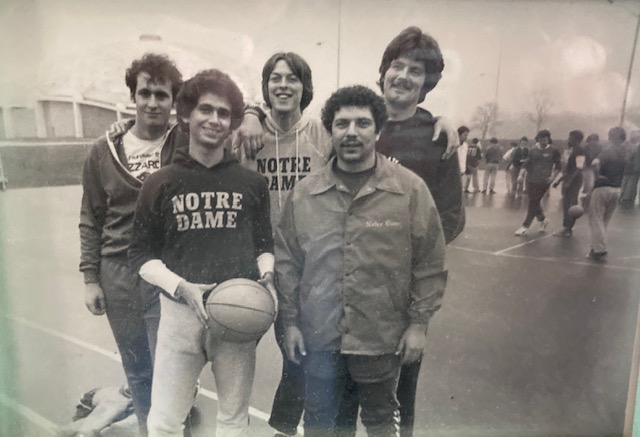
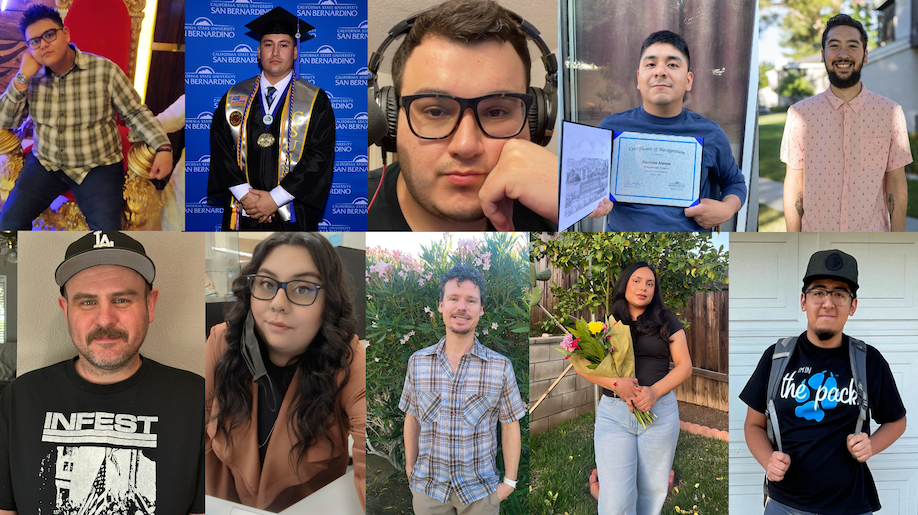
The CSUSB History Department recognized a group of excellent students with scholarships and awards this spring. The department awards and scholarships are given to outstanding undergraduate and graduate students in the History Department in a number of categories, most of which recognize students who are continuing their studies in the fall.
The Cheryl Riggs Endowed Student Award is given to a first-generation college attendee and/or adult re-entry student with an excellent academic record. Professor Riggs was herself a first-generation college attendee, and she returned to her education as a full-time re-entry student with children. This year, Evy Zermeno earned the Riggs Scholarship for her outstanding academic work, and also for her service to the department and to the campus, from leading the student journal, History in the Making, to collaborating with faculty and students in the CSUSB Anthropology Museum on the Afróntalo exhibit, and much more.
The J.C. Robinson Memorial Scholarship, given to students with outstanding academic records and an interest in Hispanic history and culture, was shared by Moises Leon, Carlos Alberto Camacho, and Maria Mendoza Gutierrez, who have all done excellent work in their studies in the History department.
For her stellar academic record, Stephanie Bullington earned the Margaret McGann Tarter Award, which was established to recognize the academic excellence of “women, veterans, and other students who are pursuing a degree in History in the hope that recipients will value learning, art, and service in their lives.”
The Michael Persell Memorial Scholarship was established to recognize outstanding students with an interest in European history and studying history for its own sake, and this year it was given to Levi James Loup in recognition of his strong academic work and energetic engagement in his classes. The Robert Blackey award, given to excellent students with an interest in History education, was earned by Bshara Alsheikh and Nathan Alexander Camacho. The Schofield-McAfee award, named for Professors Ward McAfee and Kent Schofield, is given to students whose efforts have shown improvement over time and who are nominated by current History faculty based on their outstanding efforts and excellent academic work. This year, Jaron Clampitt and Zackary Hoover shared this honor.
This spring term, two students graduated with Departmental Honors, Christian Sierra and Gustavo Alonso. Across the three programs/concentrations in the department, three excellent students were recognized with the highest grade point average. The students are Geoffrey Demke (Pre-Credential Program), Corie Blais (General Concentration), and Jesus Jimenez (Public History). Geoffrey Demke was also recognized as the CSUSB Palm Desert Campus Outstanding Graduate, as introduced in this story.
Each year, many History students distinguish themselves through their academic excellence, their engagement in department activities, and much more. These outstanding awardees are just a few of the students who make our department shine brighter with their commitment to excellent scholarship and service.
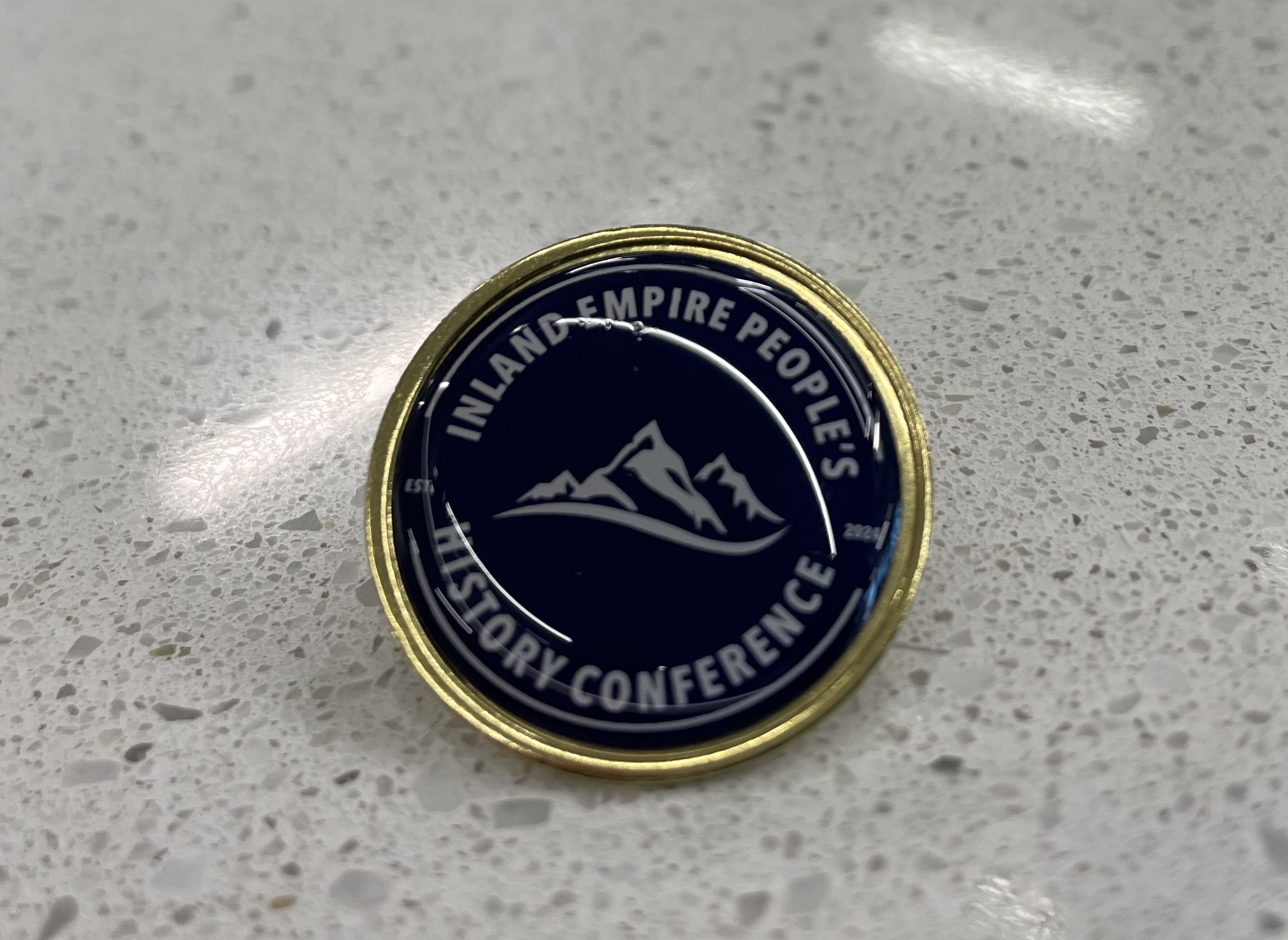
On Saturday June 1, 2024, in California State University, San Bernardino’s Center for Global Innovation, a collaborative organizing committee presented the first “Inland Empire People’s History Conference.”
The organizers (see full committee list below) brought together scholars, artists, storytellers, community leaders, and more, and the conference featured panels on a wide range of issues relevant to the past, present, and future of the I.E.
Reflecting on the success of the conference, CSUSB Sociology Professor José Muñoz, a member of the conference organizing committee, remarked, “Being able to collaborate and provide an event to allow for community and institution-based scholars to discuss and speak directly to each other was amazing.” At the end of the day, he continued that he “felt like many folks didn't want to leave.”
Dr. Muñoz also noted that the organizers of the conference consider this to be the inaugural event in what will become an annual conference.
CSUSB History Department Chair and Professor Ryan Keating officially opened the proceedings in a welcome address and noted that “conferences such as this reflect a growing emphasis on the preservation of local and regional histories as fundamental to our broader efforts to preserve the lived experiences of people and develop an inclusive understanding of our shared history." Dr. Keating, an expert in 19th-century US history, continued, "The scope and scale of presentations at this conference reflect the diverse ways in which we as scholars analyze and understand the spaces we occupy and truly reflect the ways in which individual histories impact our broader understanding of the collective past.”
Geography Professor Mike Kohout, whose work focuses on issues facing the desert regions of the Inland Empire, attended and was impressed by the diversity and energy of community activists working throughout the region, noting that "I was proud to see that many of our former students are now community leaders, working hard to ensure the Inland Empire is a great place to live for all." Over a dozen CSUSB alumni were present as either presenters, volunteers, or attendees.
CSUSB Assistant Professor of History, Michelle Lorimer presented her work at the conference, and noted, “The conference organizers created a wonderful scholarly environment that brought together a wide variety of people interested in telling stories of communities in the Inland Empire.” Dr. Lorimer, a California history expert and educator, continued, “Together with regional teachers, we shared newly available digital archival sources and lesson plans developed by educators that tell the rich history of different groups of IE residents. I hope this is the first of many I.E. People's History conferences for our area." Dr. Lorimer’s recent and relevant publications include “Turn Back the Noisy Wheels of Progress”: Modernization, Postcards, and California’s Romantic Booster Heritage," in the journal, California History (May 2024). Other History faculty who were also involved included Dr. Marc Robinson, who moderated a panel, and Dr. Daisy Ocampo Diaz, who presented her work.
The concluding keynote address was delivered by CSUSB History Department alumnus and now Assistant Professor of History at Brown University, Dr. Mark Ocegueda. His keynote address was titled, “Inland Epistemologies: The Power of Historical Knowledge, Erasure, and Imagining A People’s History of the Inland Empire."
Extensive collaborations with regional partners like University of California Riverside, San Bernardino Valley College, University of Redlands, UC Irvine, UCLA, University of Southern California, community non-profits, businesses, and other local groups show promise for the future of this new and vibrant institution in the Inland Empire.
Find a story featuring the conference from local NPR affiliate, KVCR here, and the People’s History of the Inland Empire organization webpage here.
Find a full program of the conference proceedings at this link.
Conference Organizing committee:
- Kevan Antonio Aguilar, Assistant Professor, University of California, Irvine
- liz gonzález, Instructor, University of California, Los Angeles Extension
- Catherine Gudis, Professor, University of California, Riverside
- Dr. Gudis supported the event with a portion of a National Endowment for the Humanities grant.
- Juan De Lara, Associate Professor, University of Southern California
- Audrey Maier, A People's History of the I.E.
- William Medina, Instructor, San Bernardino Valley College
- José A. Muñoz, Professor, California State University, San Bernardino
- Mark Ocegueda, Assistant Professor, Brown University
- CSUSB History Graduate and keynote speaker.
- Jennifer Tilton, Professor, University of Redlands
- Anthony Victoria, Fellow, Frontline News
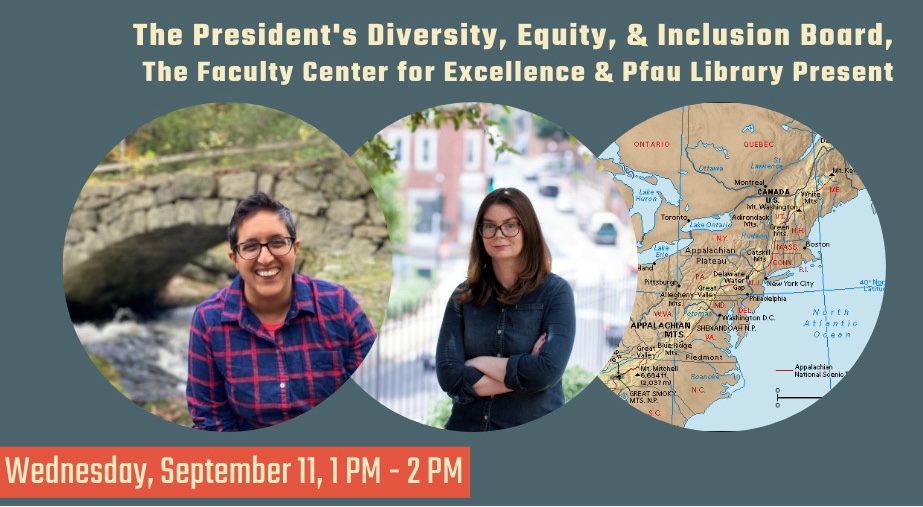
Elizabeth Catte and Neema Avashia will join us via Zoom for a hybrid event to discuss their recent work, which challenges and enriches our national conversation about Appalachia.
Join us in person or on Zoom!
Pfau Library, PL-4005, FCE, and on Zoom at https://csusb.zoom.us/j/388207496
Neema Avashia was born and raised in southern West Virginia to parents who immigrated to the United States. She has been a middle school Civics teacher in the Boston Public Schools since 2003. Her essays have appeared in the Bitter Southerner, Catapult, Kenyon Review Online, and elsewhere. Her recent book, "Another Appalachia: Coming Up Queer and Indian in A Mountain Place" (2022) was a 2023 Lambda Literary Award Finalist (Lesbian Memoir/Biography), named the BEST LGBTQ+ MEMOIR of 2022 by Book Riot, also was a New York Public Library Best Book of 2022, and was a Weatherford Award finalist, nonfiction. “This book lives beautifully in the gray area of trying to navigate a divisive environment while growing up queer and Asian American.” (Forbes) Find the book at the publishers website here, and as an audiobook from Libro.fm here.
Elizabeth Catte lives in Virginia and has written two books, "What You Are Getting Wrong About Appalachia" (2018) and "Pure America: Eugenics and the Making of Modern Virginia" (2021). "Pure America" made the 2022 PEN America Literary Awards longlist for the PEN/John Kenneth Galbraith Award for Nonfiction and was named named a Publishers Weekly Best Book of 2021. Her essays and commentary have appeared in the Washington Post, the Guardian, the Nation, on NPR, and more. She runs Passel, an applied history consulting firm, with her partner Josh, using history to solve real-world problems in Appalachia and the Mid-Atlantic. Catte holds a PhD in public history and is a member of the National Writers Union, the Authors Guild, and a board member of the Appalachian African-American Cultural Center in Pennington Gap, Virginia. Laura Adamczyk, for the A.V. Club, wrote of Catte's "What You Are Getting Wrong About Appalachia" that it is "a more focused version of Howard Zinn’s venerable A People’s History Of The United States, turning its lens to the on-the-ground civic struggles of people who have lived and died in Appalachia.”
This event is made possible by the President's Diversity, Equity, and Inclusion Board, the Pfau Library, the Faculty Center for Excellence, and the History Department.
Please send any question to Jeremy Murray, jmurray@csusb.edu, History Department.
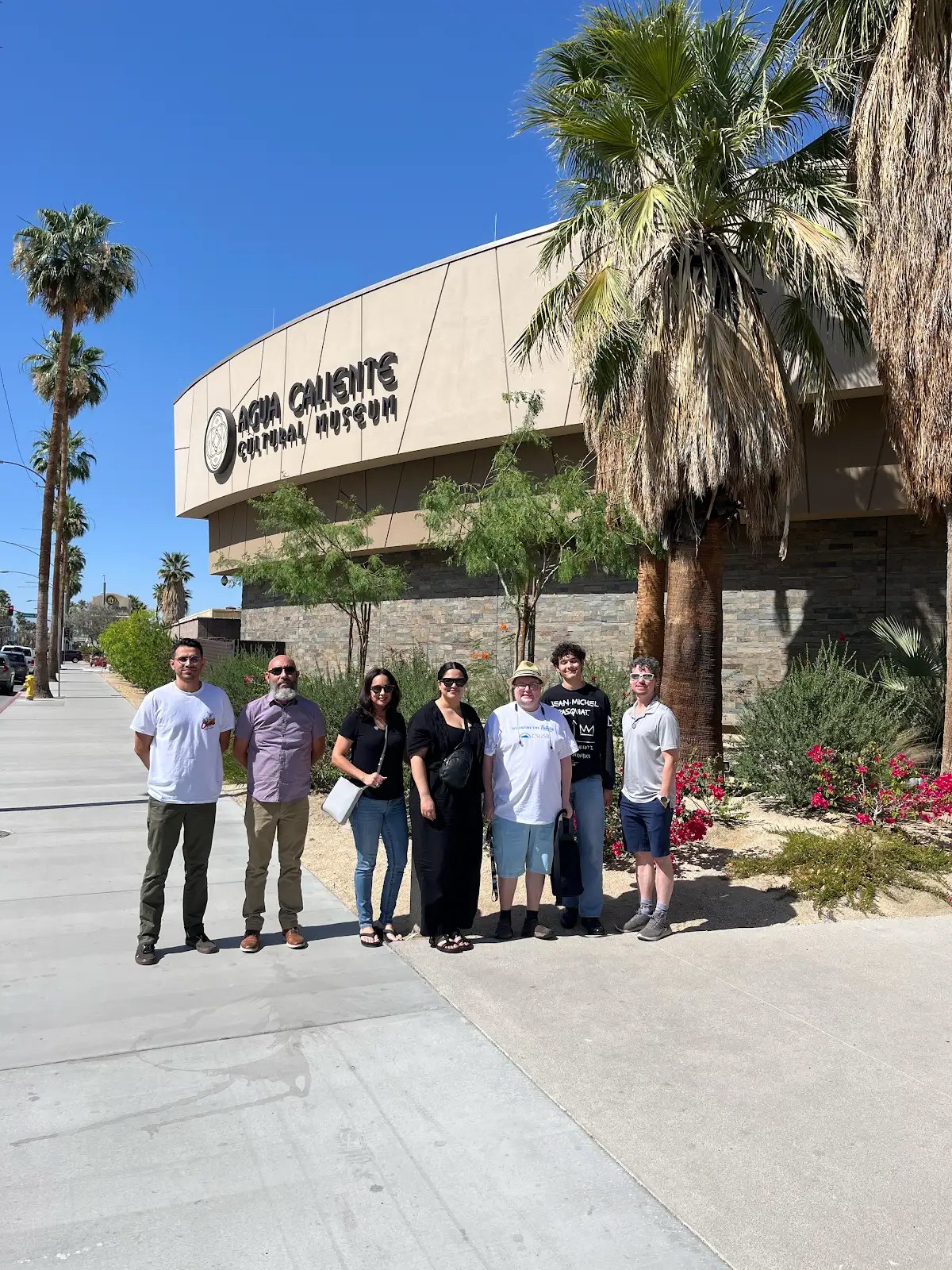
On May 24, 2024, shortly after CSUSB spring commencement celebrations, a group of outstanding History students from both the Palm Desert and main San Bernardino campuses enjoyed an excursion to a local museum and a festive dinner in the Coachella Valley.
Geoffrey Demke ('24), recently named the CSUSB Palm Desert Campus Outstanding Graduate, told me about the experience to the Agua Caliente Cultural Museum, and mentioned meeting up with classmates from the main campus History Club. "At the Cultural Museum, we started out in a big round room with displays and screens all around us, including the ceiling. The museum showed a 15-minute animated show that included lights and sounds that showed some of the legends of the Cahuilla people. This presentation was shown at a 360 degree angle so you could watch it no matter where in the room you sat. After the presentation we walked through some of the rooms that displayed some of the tools and artwork of the Cahuilla. One of the favorite things that I saw were the baskets that were made by the Cauilla."
Demke continued, "When I gave tours at the Coachella Valley History Museum, I would tell the patrons how intricate those baskets were. While the Coachella Valley History Museum had only a few baskets, the Agua Caliente Cultural Museum had an astounding variety of baskets with different shapes and designs. I was even able to watch a video of a current member of the Cahuilla who made a basket and explained that she learned to make it from her grandmother. The History Club entered the Cultural Museum together but once inside everyone seemed to gravitate to different things and we were quite spread out. Obviously, it was the baskets that grabbed my attention. There were dates and pictures of important events that happened here in the Coachella Valley. We also learned about the importance of water here in the desert. There was a room that showed huge and amazing older photos of the Cahuilla. Since the whole experience was self guided, some of us finished before others and sat on the benches while the others trickled out. We exchanged views and experiences with each other, and talked about our eye-opening experiences. We all then walked down the block to eat at a Thai restaurant. A great end to a great day."
Learn more about the History Department here, find out about CSUSB alumni here, and find the latest department news and newsletters here.
You can find out about our History Club and Phi Alpha Theta honors society here.
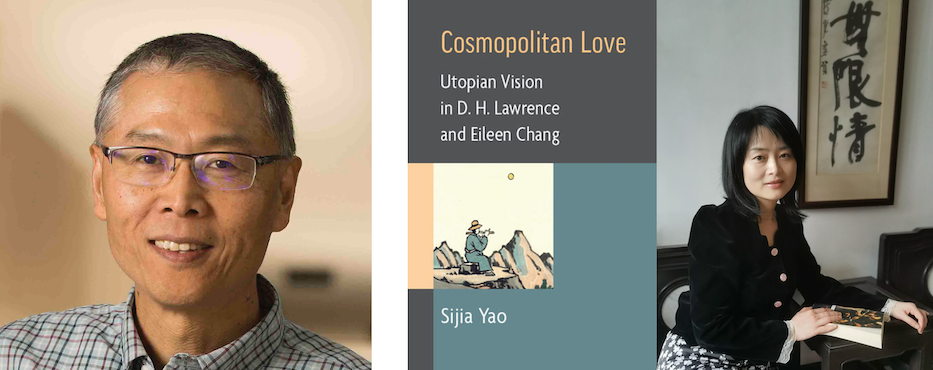
The Modern China Lecture Series events for fall will include the following. Events are hybrid, and will include a live in-person element in PL-4005 (Pfau) and also a Zoom element. Please click each event for more details and join us!
For questions, please contact Jeremy Murray (History), jmurray@csusb.edu
Find past and upcoming events in the Modern China Lecture Series here.
Event Location: Faculty Center for Excellence (FCE, Pfau Library, 4th Floor) and on Zoom (https://csusb.zoom.us/j/388207496)
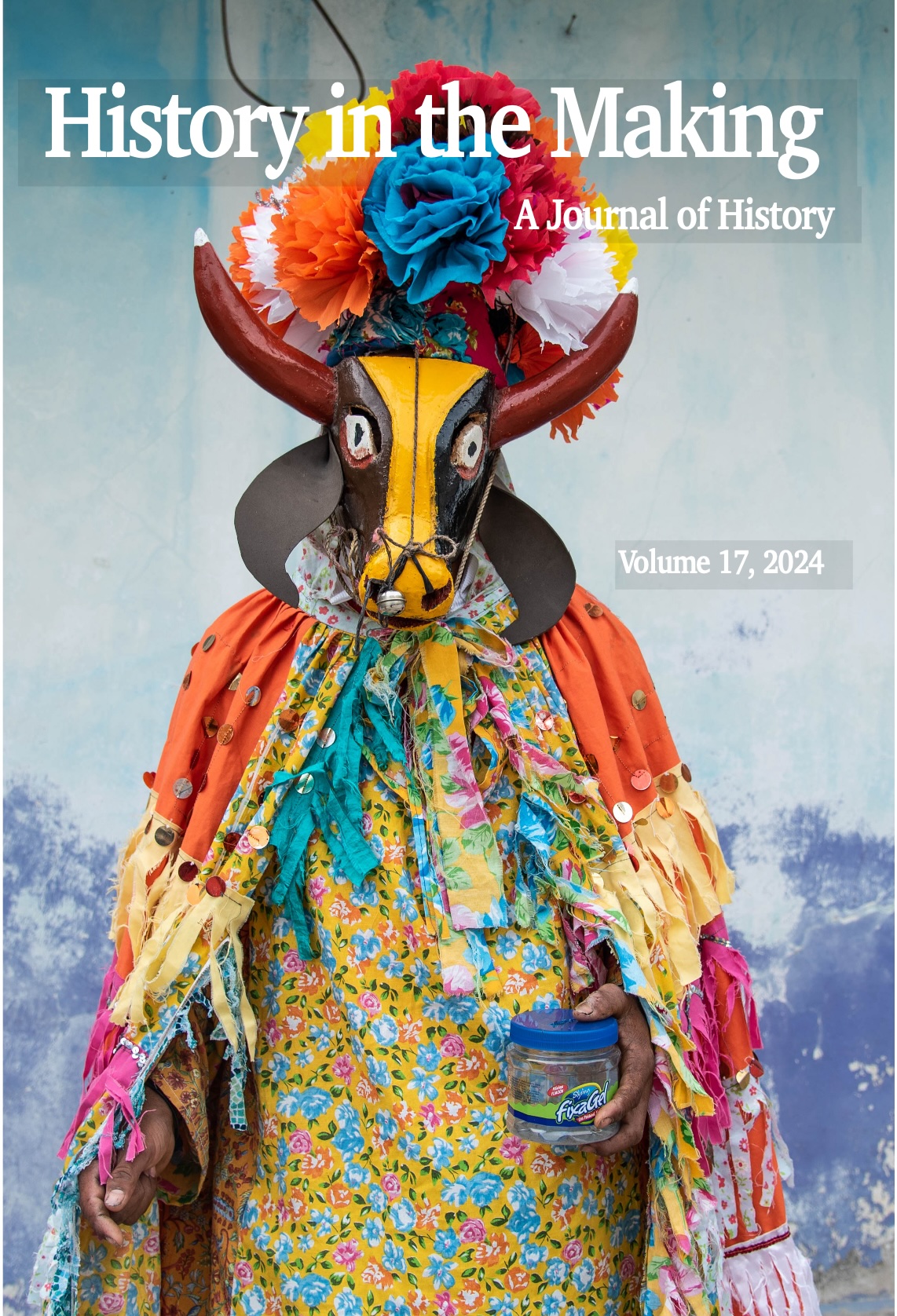
The CSUSB student journal, History in the Making has again won national recognition, in what has become a nearly annual tradition for the outstanding student authors and editors. Chief editor and second-year MA student, Evy Zermeno, led the staff and authors of the seventeenth annual issue to publication in the spring of 2024, and the issue was entered into the national competition over the summer and fall. Results were announced December 2, 2024, and the CSUSB students took second place in the graduate print category for the third year in a row.
Find the journal on ScholarWorks here, with pieces that range across a broad spectrum of issues. The issue includes travel pieces on South Africa, Vietnam, and Japan; an in memoriam celebrating the punk legacy of Sinead O'Connor; eleven film, book, and museum reviews; and feature-length research pieces on topics ranging from the local Black USO in the Inland Empire, to gender identity in American history, to cartoons of the Prophet Muhammed in Danish-Iranian relations, to Nazi propaganda, and more.
Congratulations to the student editorial staff, the student authors, and the History Department of CSUSB!
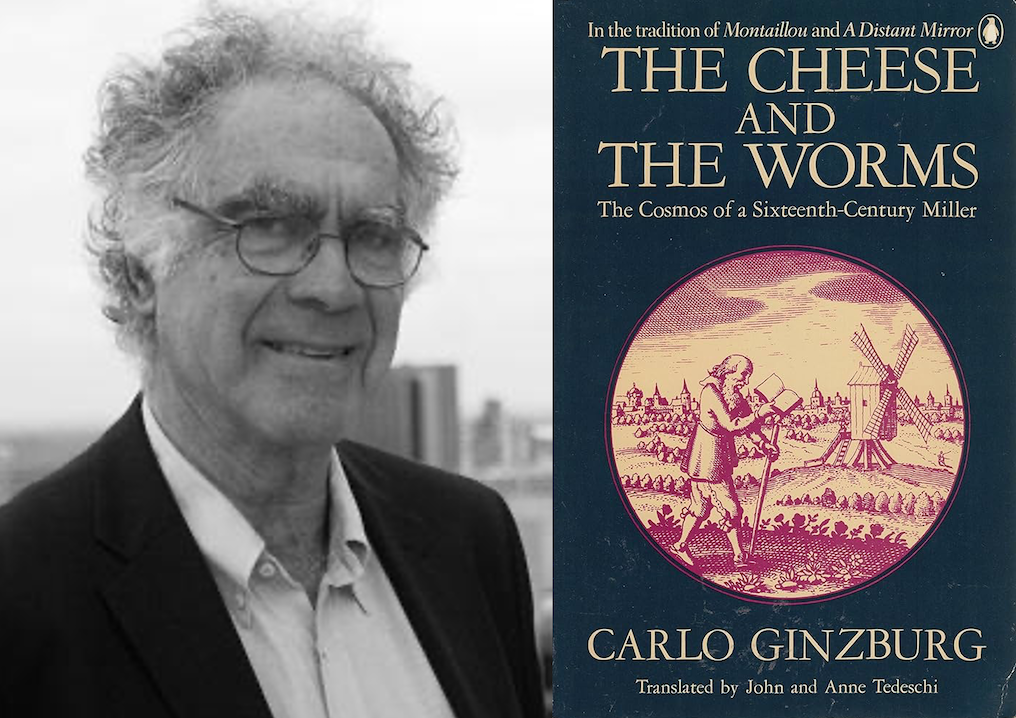
Early on the morning of December 3, a group of Master of Arts in History students hosted a video chat with one of the most impactful and prolific scholars of history in the twentieth century, Professor Carlo Ginzburg. They discussed historiography, politics, and highlights from Ginzburg's career. The early morning call allowed Professor Ginzburg to log on from Bologna, where he has retired after a career at several top institutions in Italy and also a period at UCLA. CSUSB MA students had recently read Ginzburg's formative work, The Cheese and the Worms: The Cosmos of a Sixteenth-Century Miller (1976), which had a major impact on the way historical scholarship has been done, expanding the work of the Annales School, and ushering in a subfield of "microhistory."
Ginzburg joked with the students and offered encouragement and appreciation for the chance to engage with them. Several students, including Marlet Felix and Rossandra Martinez, asked about Ginzburg's experience in research and writing. In one memorable reply, Ginzburg shared his delightful motto, "Truffles for everybody!" He elaborated that the best research and the best writing in historical scholarship should come together in the most lucid and engaging prose, and the valuable and delightful result should be made available and accessible to everybody, not hoarded in the halls of the academy or limited to the pages of scholarly journals. He challenged the emerging scholars of the MA in History program to produce the most rigorous and compelling scholarly work, and to make it engaging and accessible for the widest possible audience.
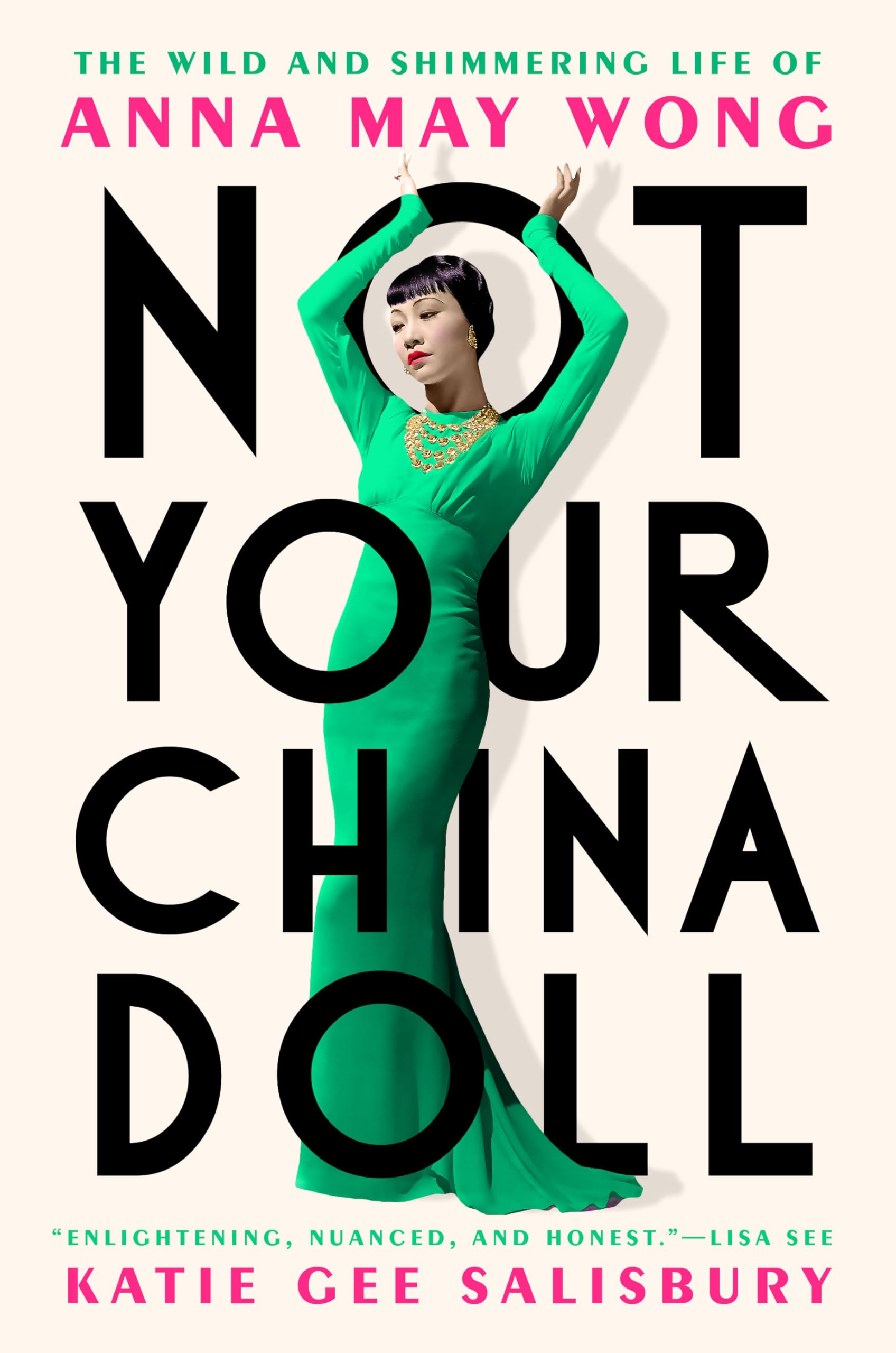
The Modern China Lecture Series will host six talks in the spring term, all in a hybrid mode with in-person gatherings as well as being shared online via Zoom. The guest speakers will present their research on a variety of topics, from the Hollywood glamour of Anna May Wong, to transgender history in China, to the future of Hong Kong, and more, with some of the featured guests joining in person and some via Zoom.
Events will be on different days of the week, different times, and different locations, so please see each event page linked below. Some will feature book give-aways for attendees in a free raffle. No sign-in or sign-up is required, and all are welcome to join in person or on Zoom.
· Wednesday, February 19, 10:30am: "Decolonizing Transgender History: Eunuchs, Renyao, and Adju," with Dr. Howard Chiang (UC Santa Barbara) Zoom and in person, PL-217, and on Zoom https://csusb.zoom.us/j/388207496
· Monday, March 3, 1pm: "Li Dazhao: China's First Communist," a book talk, with Dr. Patrick Shan (History, Grand Valley State University, Michigan) Zoom and in person, SB-210, and on Zoom https://csusb.zoom.us/j/388207496
· Monday, March 24, 1pm: "Not Your China Doll: The Wild and Shimmering Life of Anna May Wong," in conversation with author, Katie Gee Salisbury, SB-210 and on Zoom at https://csusb.zoom.us/j/388207496
· Tuesday, March 25, 5pm: A Conversation with Guardian senior China Correspondent, Amy Hawkins, and UC Irvine Professor of History, Jeffrey Wasserstrom, Zoom Only at https://csusb.zoom.us/j/388207496
· Monday, April 14, 10:30am: "Ethnic Chinese and the Politics of the Indochinese Refugee Crisis," with Dr. Lisa Tran (History, CSU Fullerton), Hybrid event: Zoom and in person, PL-217, and on Zoom https://csusb.zoom.us/j/388207496
· Monday, April 28, 1pm: "Curry Rice and Li Ang’s Crafting of Transcultural Hybridity," a lecture and discussion with Dr. Yenna Wu (UC Riverside, Dept of Comparative Literature and Languages), Zoom and in person, SB-210, and on Zoom https://csusb.zoom.us/j/388207496
The Modern China Lecture Series was initiated in January 2014 to promote awareness of important issues related to China for those on the CSUSB campus and in the community. Since then, it has presented more than 100 lectures, workshops, film screenings and roundtable forums featuring China scholars from UC San Diego, UC Riverside, the Claremont Colleges, UCLA, USC, UC Irvine, UCSB, Columbia, Oxford and other institutions, who have visited the CSUSB campus or joined via video conference to share their expertise and opinions.
Please email Jeremy Murray with questions, jmurray@csusb.edu.
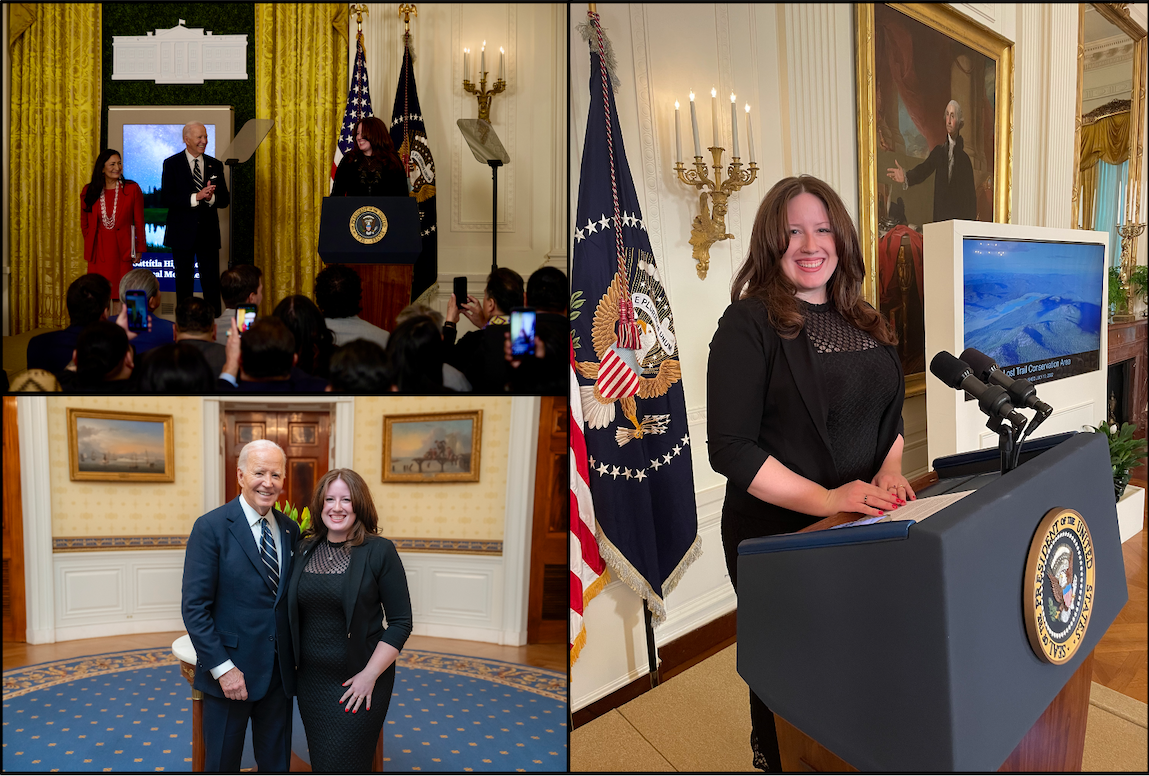
Rhian Reyes graduated from the CSUSB History Department in the summer of 2023 and by January of 2025, she was speaking at the White House with national leaders and environmental stewards in the work to preserve our natural world.
In the weeks after graduation, Reyes notes, "I was looking for work when I was emailed by the university's career center stating that Audubon CA was hiring interns to get involved in the campaign to establish Chuckwalla National Monument. I quickly applied and by September 2023, I was giving a speech at the Chuckwalla National Monument Campaign Launch and introducing Congressman Raul Ruiz, the congressional champion of the monument. From there, I interned with the Mojave Desert Land Trust before being hired full time as a Campaign Organizer for Audubon California. I worked diligently on the monument campaign by getting business letters of support and doing outreach in the community to gain broad support for the monument. I played an instrumental role in the Chuckwalla National Monument listening session last May hosted by former Secretary of the Interior, Deb Haaland, and the public meeting hosted by the Department of the Interior in June 2024. Due to this work in community outreach and organizing, as well as my experience with public speaking, the White House staff at the Council on Environmental Quality reached out to me asking if I would give a speech and introduce former President Biden at the signing of the Chuckwalla National Monument proclamation."
In her speech, Reyes noted the natural beauty and the scientific value of the Coachella Valley, and her journey to learn to appreciate it, engage with it, and begin working to protect it. She found empowerment in her conservation journey and learning what was required in the work to help protect Chuckwalla. Reyes praised her allies in the work, including Congressman Ruiz, Senator Alex Padilla, Secretary Haaland, and finally, the leadership of President Joe Biden, whom she graciously introduced to the enthusiastic crowd gathered at the White House. At the urging of passionate advocates and environmental stewards like Rhian Reyes and Secretary Haaland, President Biden protected 644,000 acres in the Chuckwalla National Monument, south of Joshua Tree National Park. These lands are now protected from mining and drilling, adding to the 674 million acres of public lands and federal waters that President Biden protected during his presidency, more than any other US President.

CSUSB History Professor Alicia Gutierrez-Romine published her work in the January 2025 issue of the American Historical Association's flagship news magazine Perspectives. The article, "Her 'Health and Thus Her Life': Abortion Exceptions in Legal History," places recent developments in abortion rights into a longer context, considering the history of abortion access in California before Roe V. Wade and beyond Dobbs V. Jackson.
Dr. Gutierrez-Romine brings precision and rigor to her historical analysis of a topic that polarizes the American public, concluding, "Bans don’t prevent abortions. They dehumanize those seeking the procedure by forcing them to procure them illicitly, in less-than-safe-or-ideal conditions, or they subject these persons to the indignity of begging for medical care at their most vulnerable moments. Nevertheless, when it comes to abortion, it seems like we continuously refuse to learn from lessons of the past."
Dr. Gutierrez-Romine's work has been featured in a number of news outlets, as well as in her recent monograph, From Back Alley to the Border: Criminal Abortion in California, 1920– 1969 (Univ. of Nebraska Press, 2023).
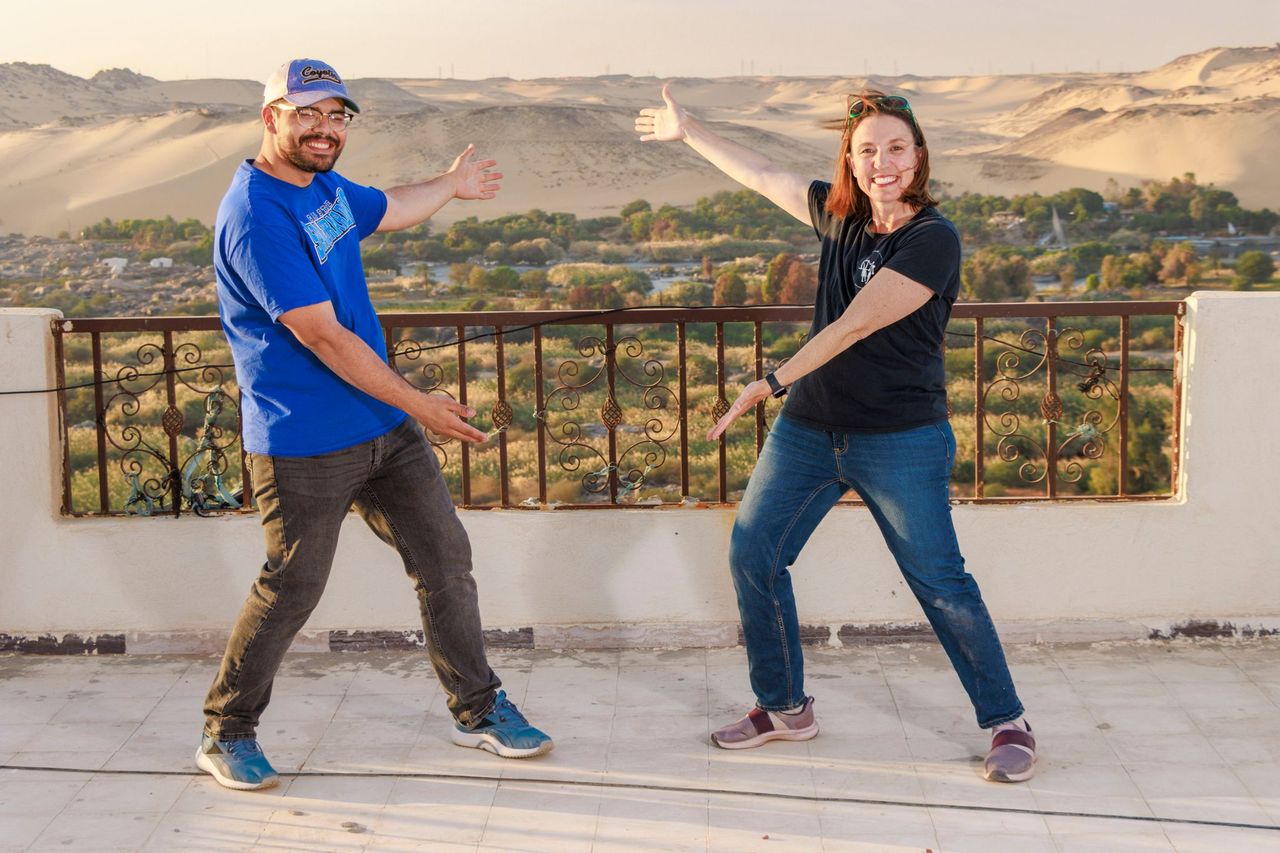
History Professor and Benson and Pamela Harer Fellow in Egyptology, Dr. Kate Liszka recently returned with her team from another season in Egypt. This time, recent CSUSB alumnus, Nathaniel Saavedra joined the team. Nathan had just graduated in December 2024 with a BA in History and also with a Certificate in Egyptology. He hopes to go on to student Ancient Economic History at the graduate level.
- You can learn much more about this most recent trip if you check out this item from "Stories from the Pack": CSUSB students, alumni and faculty dig into Ancient Egypt’s past
- Also check out this video: "Wadi el-Hudi Expedition in Egypt helps CSUSB students build career skills and define their future"
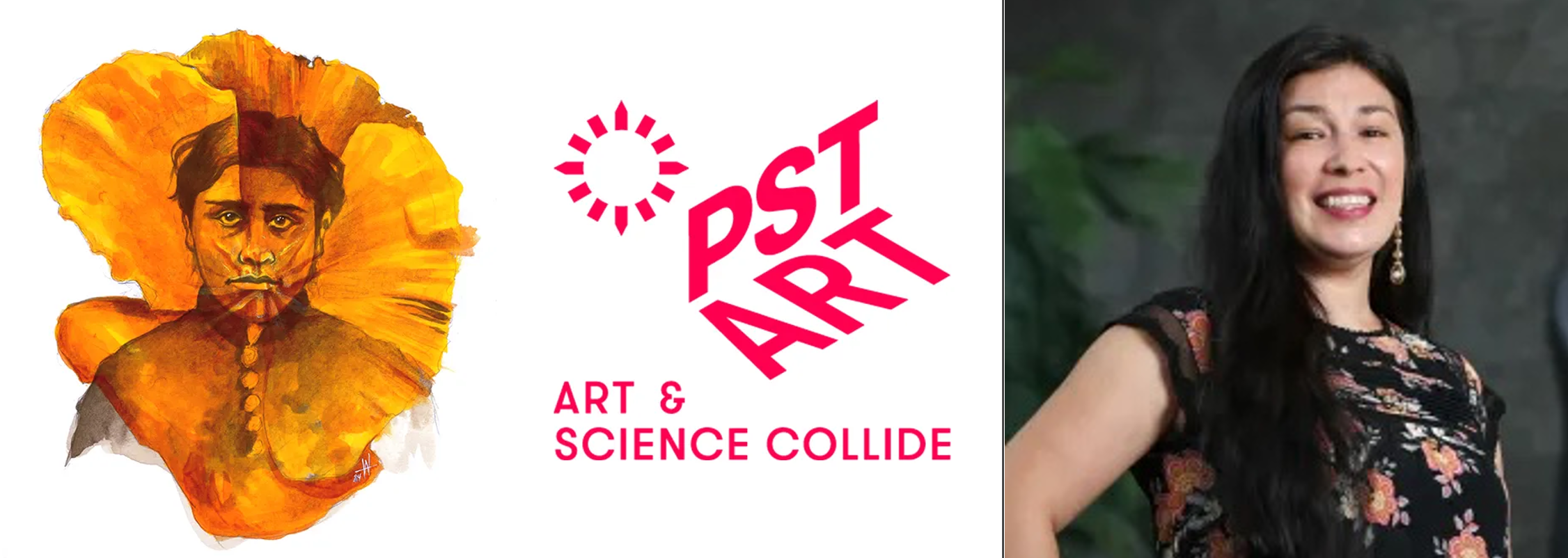
Due to the Palisades/Altadena Fires actively taking place during the scheduled opening, the "Fire Kinship: Southern California Native Ecology and Art" exhibit at the UCLA Fowler Museum was rescheduled to Saturday, February 22 at 6PM for this year's Getty Pacific Standard Time programming under the theme "art and science collide."
Fire Kinship seeks to counter attitudes of fear and illegality around fire, arguing for a return to Native practices in which fire is regarded as a vital aspect of land stewardship, community well-being, and tribal sovereignty.
Dr. Ocampo Diaz curated the exhibit in conjunction with various Tongva, Kumeyaay, Cahuilla and Payomkawichum communities. She also had support from two outstanding CSUSB History graduates, Michael Chavez (BA/MA) and Lina Tejeda.
Join Dr. Daisy Ocampo Diaz (History) at the UCLA Fowler Museum Saturday, February 22, 2025, 6-9 PM for the public opening of "Fire Kinship: Southern California Native Ecology and Art." Food, drinks, exhibition tours, and a warm welcome will fill the gathering. RSVP below.
Find out more about the exhibit here and here. Find out more about Dr. Daisy Ocampo Diaz in this recent CSUSB News item.
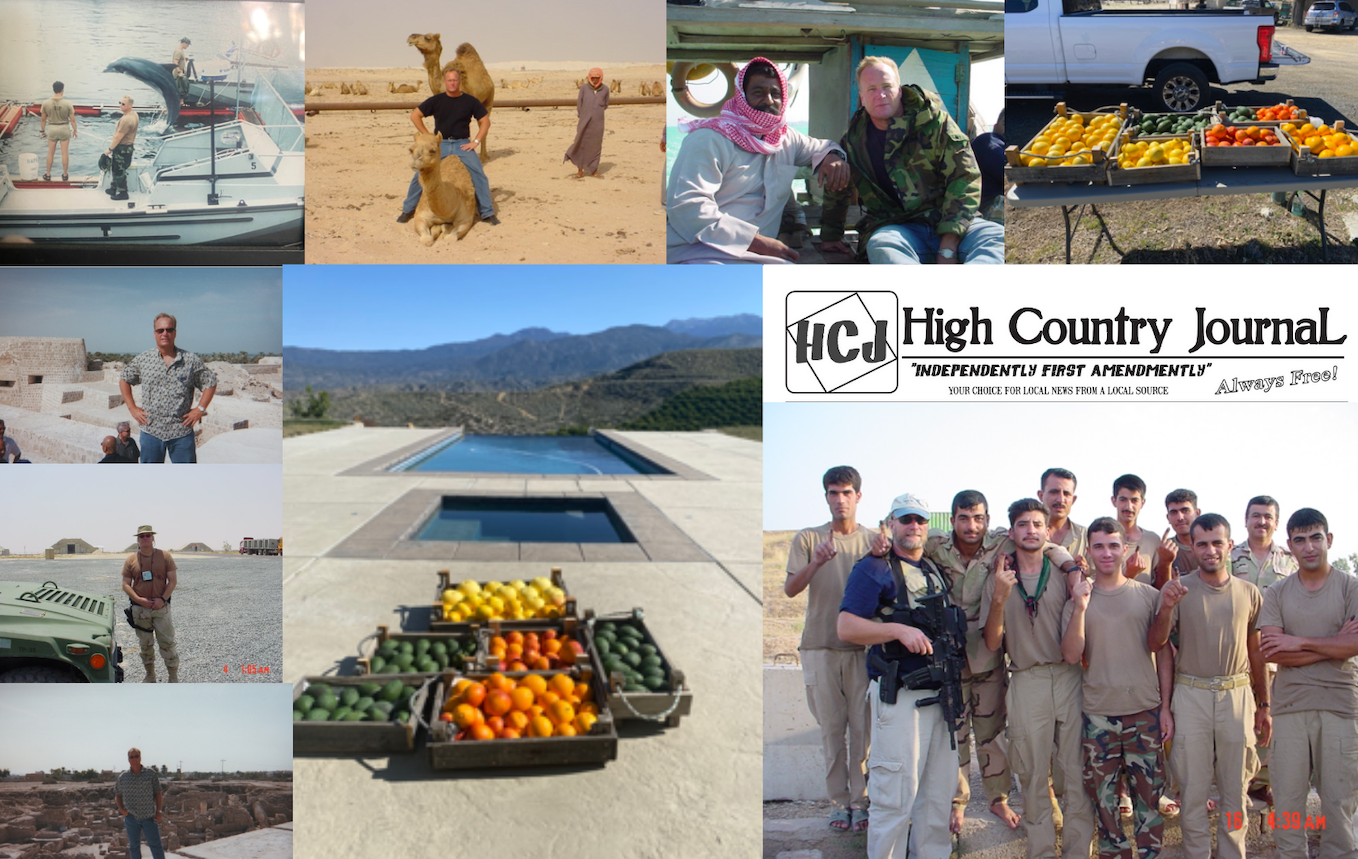
"An old warrant officer" has written a regular opinion column over the past five years for the High Country Journal (HCJ), "a twice-monthly local news publication that serves the High Country Corridor in unincorporated Riverside County." These columns combine the writer's historical insights, sharp political analysis, and a ready wit for the HCJ's readership in Anza, California. They also bring to bear the "old warrant officer's" ethos built on a life of military service that took him around the globe for just about every branch of the armed services, and they incorporate the locally-rooted experiences of a former firefighter and Southern California native. This "old warrant officer" is Terry Brennan, a recent graduate of the CSUSB History Department with his Bachelor of Arts, and a current member of the CSUSB Master of Arts in History program.
The High Country Journal serves over 3,000 regular Anza subscribers in print and across social media platforms. These subscribers have heard regularly from Mr. Brennan, beginning with his first column that came shortly after the attempted insurrection and violent overthrow of election results led by supporters of US President Donald Trump on January 6, 2021, following his election defeat to President Joe Biden. For many, like Brennan, this assault on American democracy revealed a deep divide in American culture that needed to be framed in a longer context so that readers could contemplate the aspirational ideals of the country alongside its darkest moments.
Since that first column, Brennan has illuminated important topics for his readers, sometimes teasing out the rhymes in our history, and helping to contextualize the bewildering upheavals of a polarized nation. These themes have included troubling comparisons to authoritarian rulers, and insights that challenge our deeply ingrained narratives of American history. In his studies as an undergraduate and now as a graduate student, Brennan's interests have ranged widely from the early Americas and the contested historiography of the conquistadors to the current American politics of the far right. His military service taught rough lessons of the potential for human cruelty in extreme circumstances, and also the urgency of care and community extending across social and political divisions.
These days, Brennan tends his farm, reads and writes, and enlivens graduate history seminars with his measured and thoughtful contributions. Almost every week, Brennan's classmates and faculty are also treated to a cornucopia of produce from his farm in Anza, as he brings lemons, guavas, avocadoes and more, shared by the cartload with the only caveat that he'd appreciate a slice of any treats made with the bounty. Brennan relishes the opportunity to discuss and debate history with his classmates, joking that it’s welcome mental exercise after several health episodes threatened to slow him down in recent years. These days, he shows no signs of slowing down. Brennan's faculty and classmates benefit from his diligent reading and sharp reasoning, as well as his wise perspective, through the lens of a rich life, fully lived and deeply examined.
California State University, San Bernardino serves the Inland Empire to empower and enrich the people in a diverse region. Students like Terry are among those attracted to CSUSB and its mission and work. CSUSB consistently earns its place among the top institutions nationwide in serving military veterans and non-traditional students who return to their education bringing a world of experience and enriching the learning environment of our campus.
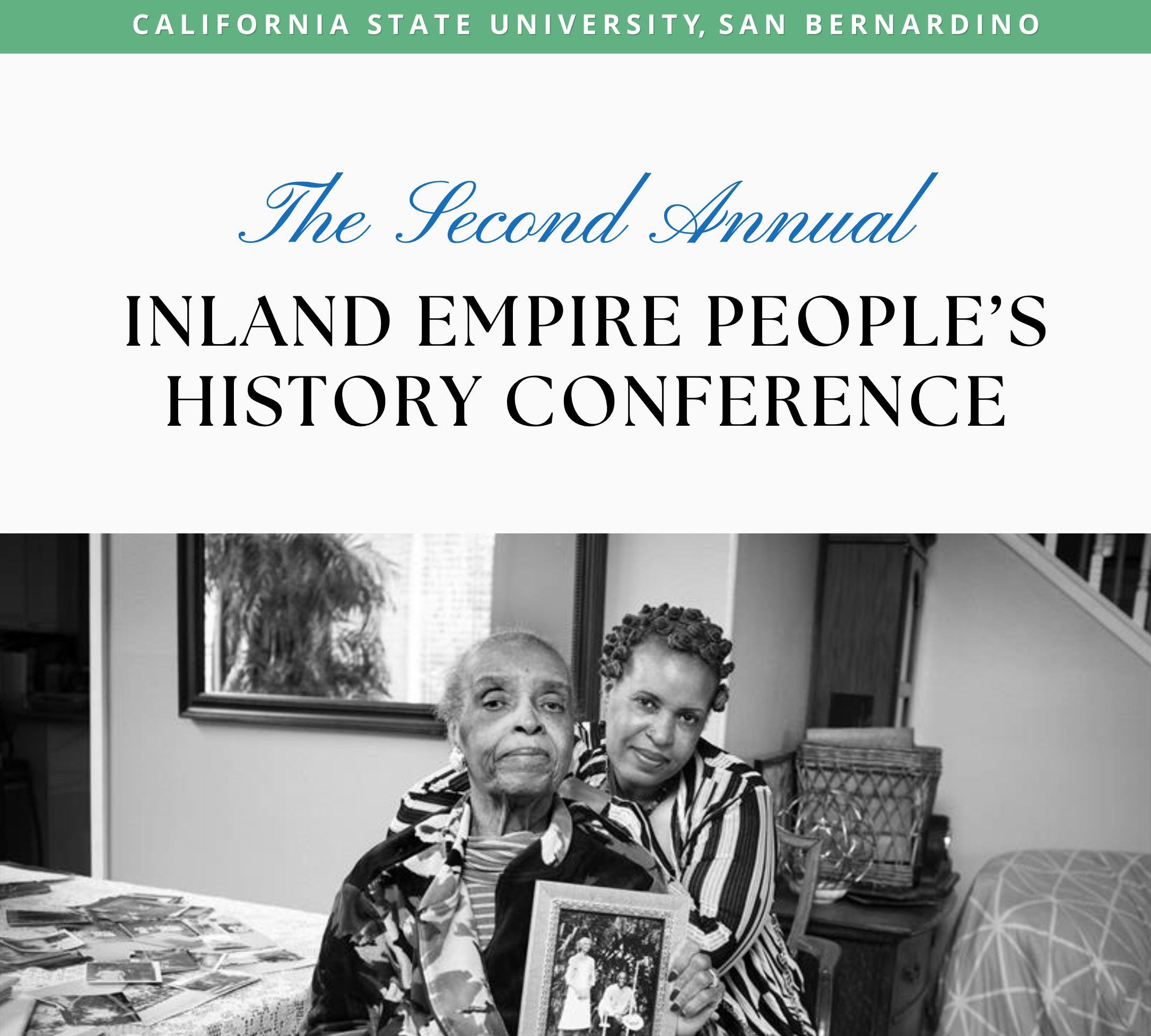
On May 3, 2025, CSUSB hosted the second annual "Inland Empire People's History Conference," studying and honoring the distinctive histories of the Inland Empire region. As an anchor institution in the city of San Bernardino and the wider region, California State University San Bernardino has held this conference as a way to commemorate and engage in serious study of the IE, and to bring together leading scholars, artists, poets, public servants, community organizers, and more. Numerous faculty, staff, and students made the event possible, including our History Department's Professor Marc Robinson, Sociology's Professor José Muñoz, and others.
The first conference was held last year, partnering with other regional institutions. This spring, CSUSB faculty solidified this new tradition. Panels included a range of experts and emerging scholars, presenting their work on themes including warehouse activism, antifascist traditions, music and crafts, classroom education and museums, LGBTQ+ rights, racial justice, mapping data, and much more. The presenters and the topics reflected the priorities of scholars, craft workers, history keepers, public servants, and activists in the region. Current students connected with faculty, alumni, and community partners in the gathering of over 200 people.
First-year Master of Arts in History student, Gustavo Alonso attended the conference and noted: "From learning about local histories, art, activism, music, or culture, the IE Conference truly encompasses some of the best cultural, social, and political experiences the Inland Empire has to offer. Conferences such as this one are vital for spreading awareness about local histories and demonstrate the importance of the IE region in the larger context of the nation. It is a place where scholars of equal interest can get together and spread their knowledge. At the same time, it is a place where everyone is welcome to learn more about the place they call home."
Professor Marc Robinson noted of the conference, “It was an honor to be one of the co-organizers of the IE Peoples History Conference. It was great and it had many highlights, but the conference keynote was especially memorable for me. One reason was that I was proud to be introduced by Viviana Alvarez, a CSUSB history alum, a former student of mine, and a current PHD student at the University of California Irvine. In addition, the keynote address featured four local poets, Casandra Lopez, Juanita Mantz, Isabel Quintero, and Romaine Washington, who all provided moving portraits of the Inland Empire with their words. It was a beautiful, moving, and wonderfully unconventional conference keynote.”
2025 MA in HIstory graduate, Randi Stoner presented her work at the conference in a paper title, "A Secluded Spot on a Side Road," which built on her MA thesis investigating the legal history of the region in the interwar years through the prism of a single entrapment case, focusing on homophobic policies and institutionalized bigotry in law enforcement and the legal system.
This is the beginning of a rich tradition, bringing hundreds of interested students, scholars, and regional partners! Find the conference page here, and look out for future events!
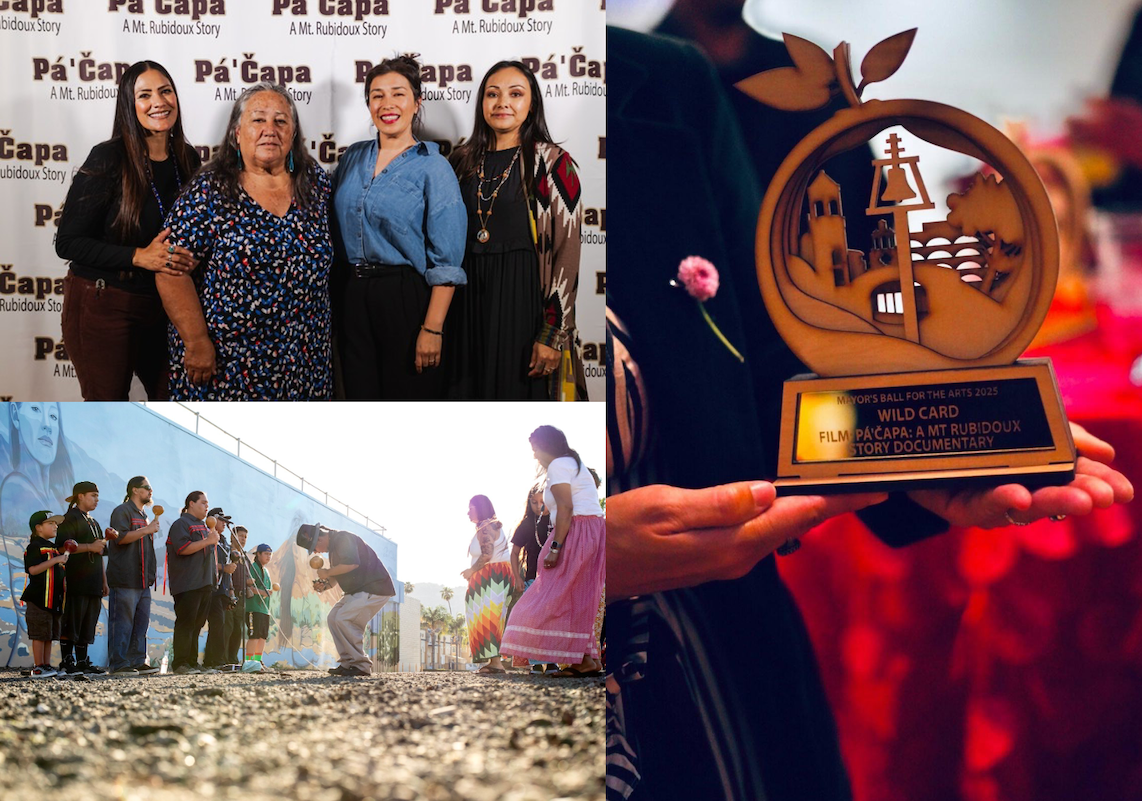


A recent graduate of the CSUSB Master of Arts in History program has published several articles that reflect the urgent issues of the moment in southern California. José Luis Castro Padilla is now a PhD student in the UCLA César E. Chávez Department of Chicana/o and Central American Studies, working at the intersection of faith, immigration, and race in American history.
Most recently, Castro Padilla published an article titled, “Los Angeles Fights Back: Catholics in the Mexican American Struggle for Dignity,” in Perspectives, the flagship journal of the leading American professional association of history scholars, the American Historical Association. His timely work is illuminating for scholars across disciplines, and provides rich context for troubling current events.
As CSUSB MA in History student advised by Professor Michael Karp, Castro Padilla gained writing and editing experience publishing multiple articles and reviews in the CSUSB History Department’s award-winning student journal, History in the Making. These published works included a review of the Workman and Temple Family Homestead Museum, where he also served as a docent.
Karp noted, “It was such a privilege to have Jose as a student. From the outset of his time in our MA program, he worked with diligence and a keen eye for how historical scholarship can inform our present day challenges. That passion has clearly carried directly into his doctoral studies and recent publications. We’re proud to have had the chance to work with a rising scholar like Jose.”
Castro Padilla noted, “One of the things I'm grateful for is having had the opportunity to contribute to the History in the Making journal. The editors' support and collaborative approach helped me understand how scholarly and opinion articles are created and published. This experience helped me with my academic growth.” About his time in the CSUSB History Department, Castro Padilla continued, “I'm proud to be a CSUSB alumnus. Dr. Murray, Dr. Karp, and the history department helped me achieve my next academic step: entering a doctoral program at UCLA. They never left me alone and guided me to the end.”
Born and raised in Mexico City, Castro Padilla earned a Bachelor of Arts in Communication Studies in Mexico, and a second Bachelor of Arts in History at California State Polytechnic University, Pomona. He was a member of the inaugural cohort in the CSUSB MA in History program, starting in 2020 and graduating in 2022.
Today, Castro Padilla continues to work across disciplines and make scholarly analysis and contextualization accessible to a wider audience. In another recent article, “Before Brown v. Board of Education: Paul J. McCormick, the Mendez v. Westminster Decision, and its Religious-Social Context,” for the journal, U.S. Catholic Historian, Castro Padilla expands our understanding of the intertwined histories of Los Angeles, desegregation, and immigration on the eve of the civil rights movement.


Professor Michael Karp (CSUSB, History) has published a new book that brings together a wide range of historical subfields. In Raising the Redwood Curtain: Labor Landscapes and Community Violence in a Pacific Littoral (University of Nebraska Press, 2025), Karp’s research ranges across 75 years in the history of Humboldt County, tying together violent episodes from 1860 to 1935. These incidents illuminate some of the ways in which violence shaped the settlement of northwestern California and the American West more broadly.
Professor Michael Karp has accrued extensive classroom experience as a history educator across different levels of instruction from middle to high school, community college, and now at CSUSB, where he teaches a range of courses on the Palm Desert Campus, and also serves as Co-Director of the Porter History-Social Science Resource Center. He has become well known to students as a knowledgeable advisor and an empowering mentor, guiding graduate theses and helping to prepare students for many careers. With Professor Michelle Lorimer, he has recently been especially active in helping those History students who are hoping to follow him into the field of history education.
In praise of Dr. Karp’s new book, Professor Stacey L. Smith of Oregon State University notes that Karp “expertly blends environmental history, labor history, and the history of race to reveal how diverse peoples’ working relationships with the landscapes of California’s northwestern redwood country transformed patterns of global economic exchange, migration, class conflict, and intergenerational racial violence. His extensive research and sharp analysis demonstrate that this little-known region, often dismissed as an isolated rural backwater, was essential to the construction of the U.S. settler colonial state and to the expansion of capitalism across the Pacific World.”
Professor Karp double-majored in history and religious studies at Cal Poly Humboldt, and then earned his MA and PhD in history at Saint Louis University. His newest research project seeks to explore how access to water has structured race and class inequalities in California's Colorado Desert.